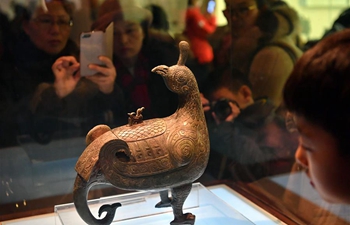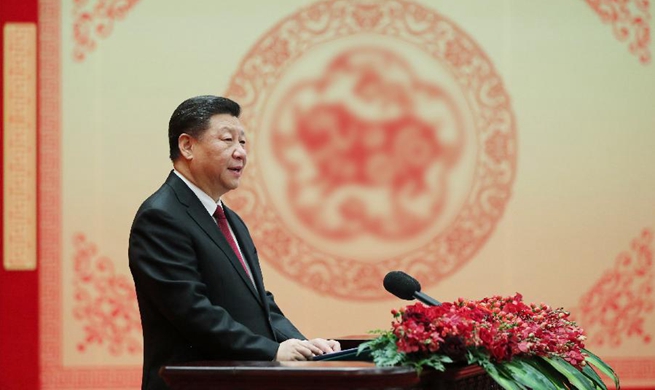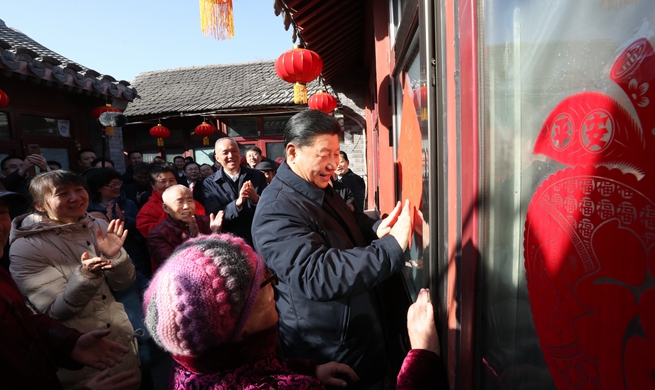by Murad Abdo
ADEN, Yemen, Feb. 9 (Xinhua) -- Representatives of the two Yemeni warring sides participated in talks sponsored by the UN in Jordan in an attempt to achieve progress toward implementing the prisoner exchange deal declared in Sweden.
However, the delegations of Yemen's internationally recognized government and the Houthi rebels concluded the two UN-sponsored rounds of talks without achieving constructive results, leaving thousands of detainees who are dreaming of reuniting with their families in continued pain.
The warring sides blamed each other for undermining the ongoing peace efforts and breaking down the negotiations in Jordan's capital Amman, with the presence of the UN special envoy to Yemen Martin Griffiths.
Yemeni observers and political analysts said the negotiating teams treated each other with suspicion and lacked mutual trust, which was one of the main factors behind the failure of Jordan's talks.
"New obstacles came up and impeded implementing the prisoner swap deal because the two-warring sides are still accusing each other of lying and submitting fake lists of detainees," said Abdul-Raqeeb Hidyani, a political analyst.
"The government representatives see the Houthi representatives as liars and insist on releasing all the prisoners from Sanaa jails," he added.
Yahya Abu Hatim, a strategic military expert, blamed the Iranian-backed Houthis for having serious reservations on the prisoners' list provided by the government delegation.
"Houthis are not really willing to hand over prisoners with the government authorities because they came just to rule and are still kidnapping people from workplaces on a daily basis," Hatim said.
"The Houthi negotiators included fake names belonging to hundreds of their fighters who were killed during battles with the government forces," he added.
Ali Ban Hadi, an Aden-based military analyst, said exchanging prisoners and war detainees should take place until after the end of the conflict or under a political agreement.
"The armed confrontations are still taking place fiercely and each side will attempt to keep prisoners as long as possible because no peace atmosphere is available," Hadi said.
"It's not an easy task to achieve success in this issue because the situation is still very complicated militarily and the warring factions will attempt to keep prisoners as a value card," he explained.
On the government side, former Defense Minister Mahmoud Subaihi, who has been held by the Houthis since they overran Sanaa in late 2014, and President Abdu-Rabbu Mansour Hadi's brother Nasser, a former senior intelligence official, were included in the exchange list.
Haitham Abu Vadi, an Aden-based journalist and writer, ruled out the idea that the Houthis will agree to release high-ranking military leaders including Subaihi.
"The government wants to conduct a comprehensive swap deal but the Houthis prefer to swap specific names of detainees with low value, excluding the senior officials," Haitham said.
Sources confirmed to Xinhua that the two-warring sides agreed to hold a third round of talks to resolve issues but did not specify when or where the talks could take place.
On Friday, the Yemeni government and the Houthis decided to continue their meetings related to the swap of prisoners and to provide more time for finalizing the lists of prisoners to be covered by the deal.
Following days of negotiation, the two-warring sides reached an agreement in Jordan's capital Amman to exchange 2,000 bodies, 1,000 for each side, in three phases.
According to Ahmad Abu Hamzeh, a member of the negotiating team of the Houthis, the first phase will start in three weeks and the two sides will start by exchanging bodies in the morgues.
The second phase will focus on the bodies in cemeteries far from the front lines, which will last two months, while the third includes the bodies left on the battleground and the frontlines, which will take a longer time until a cease-fire is reached.
Representatives of the Yemeni government and the Houthi rebels started their second meeting in Amman on Tuesday to review the final list of prisoners to be exchanged under a prisoner swap agreement reached between the two sides.
In December 2018 and following consultations in Sweden, the two sides reached the agreement to swap about 15,000 prisoners.
The Sweden Agreement called for the urgent need to address the dire humanitarian situation and insecure conditions faced by the Yemeni people.

















